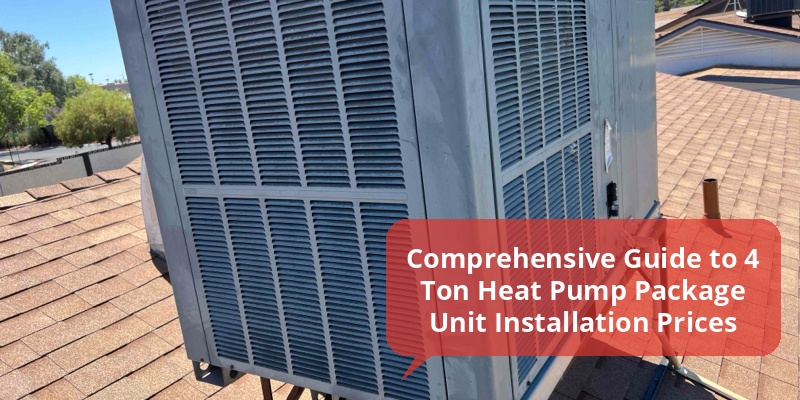Choosing the right heating and cooling system for a home or business involves understanding both the equipment and installation costs. The 4 ton heat pump package unit is a popular choice for medium to large spaces due to its efficiency and dual functionality. This article explains the typical price range for installing a 4 ton heat pump package unit, factors influencing cost, and what consumers should expect during the installation process.
| Factor | Typical Cost Range | Notes |
|---|---|---|
| Unit Price | $3,000 – $5,500 | Depends on brand, SEER rating, and features |
| Installation Labor | $1,500 – $3,500 | Complexity of ductwork and location impact pricing |
| Additional Materials | $300 – $800 | Includes piping, electrical wiring, permits |
| Total Installed Price | $4,800 – $9,800 | Varies based on location and contractor |
What Is a 4 Ton Heat Pump Package Unit?
A heat pump package unit is an all-in-one HVAC system that houses heating and cooling components in a single outdoor unit. The “4 ton” capacity refers to the unit’s ability to cool approximately 48,000 BTUs per hour, making it ideal for homes or commercial spaces ranging from 2,000 to 3,000 square feet. These units provide both heating and cooling by transferring heat rather than generating it through combustion.
Average Cost Breakdown of Installing a 4 Ton Heat Pump Package Unit
The total price for installation includes multiple components beyond just the price of the unit. Understanding each cost segment helps consumers budget accordingly.
Unit Cost
The heat pump package unit itself typically costs between $3,000 and $5,500. High-efficiency models with advanced features like variable speed compressors, two-stage operation, or enhanced SEER ratings will be priced higher. Popular brands include Lennox, Trane, Carrier, and Goodman.
Installation Labor
Labor costs range from $1,500 to $3,500, depending on the complexity of the setup. Factors such as existing ductwork conditions, unit placement, and local labor rates influence cost. Installation usually requires certified HVAC technicians to ensure proper system integration and compliance with local codes.
Additional Materials and Fees
Materials like refrigerant piping, electrical connections, permits, and mounting brackets typically add $300 to $800 to the overall price. Some projects may require duct modifications or upgrades, which can increase material needs.
Factors Influencing Installation Price
- Location and Climate: Colder climates may require heat pump models suited for low temperatures, impacting cost.
- Existing HVAC Infrastructure: Older buildings might need duct replacements or electrical upgrades.
- Brand and Efficiency Level: Premium units with higher efficiency ratings (SEER 16+) cost more upfront but save energy long term.
- Unit Features: Options such as Wi-Fi capability, multi-stage heating, and noise reduction add to price.
- Contractor Selection: Licensed and experienced contractors may charge higher but offer better quality installation and support.
Installation Process Overview
The installation of a 4 ton heat pump package unit involves several key stages. The proper handling of each contributes to system longevity and performance.
Site Assessment and Preparation
Evaluators inspect the property for unit placement, ductwork condition, and electrical compatibility. Proper site selection ensures efficient airflow and minimizes noise.
Unit Placement and Connection
The package unit is installed outdoors, often on a concrete pad or roof, then connected to the building’s duct system and electrical supply. Ensuring proper sealing and insulation is critical.
System Charging and Testing
Technicians charge the system with refrigerant and conduct performance tests, including airflow checks and thermostat calibration. This step confirms the unit is operating within manufacturer specifications.
Why Choose a 4 Ton Heat Pump Package Unit?
Heat pump package units offer energy-efficient heating and cooling combined into one compact solution. This reduces installation space requirements and simplifies maintenance compared to separate systems. The 4 ton capacity is optimal for moderate to large homes, delivering consistent comfort and utility savings.
Energy Efficiency and Long-Term Savings
Modern 4 ton heat pump package units achieve SEER ratings from 14 to 20 and HSPF values between 8 and 12, which measure cooling and heating efficiency respectively. Higher efficiency models may have higher upfront costs but typically yield significant savings on energy bills over time.
| Efficiency Rating | Potential Energy Savings | Estimated Payback Period |
|---|---|---|
| SEER 14-16 | 10-15% | 6-8 years |
| SEER 17-20+ | 20-30% | 3-5 years |
Common Additional Costs to Consider
- Permits: Depending on local regulations, necessary permits for HVAC installation may add to upfront costs.
- Ductwork Replacement: Aging or damaged ducts should be repaired or replaced to maintain efficiency, adding labor and materials.
- Electrical Upgrades: Older homes may require electrical panel updates or dedicated breakers to accommodate the new unit.
- Thermostat and Controls: Smart thermostats compatible with heat pumps may increase initial costs but enhance control and convenience.
Financing and Incentives for Heat Pump Installations
The cost of a 4 ton heat pump package unit installation can be offset through financing options and government incentives. Many states and utility companies offer rebates for installing energy-efficient HVAC systems. Examples include:
- Federal Tax Credits: The Inflation Reduction Act provides tax credits for high-efficiency heat pump installations.
- State Rebates: States like California, New York, and Massachusetts offer cash incentives for upgrading to heat pumps.
- Utility Programs: Local utility providers often have rebate programs encouraging energy-efficient heating and cooling equipment.
Consumers should check eligibility and apply early to maximize savings opportunities.
Tips for Choosing the Best HVAC Contractor
- Verify Licensing and Insurance: Ensure the contractor is licensed to work in your state and carries appropriate insurance.
- Request Multiple Quotes: Get several estimates to compare prices and understand service offerings.
- Check Reviews and References: Read customer feedback and ask for references to gauge reliability and quality.
- Ask About Warranties: A good contractor will offer warranties on both equipment and workmanship.
- Discuss Maintenance Plans: Regular maintenance is key to sustaining system efficiency and lifespan.
